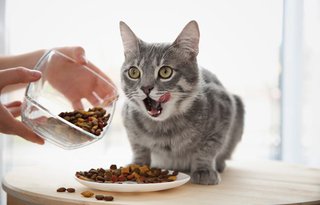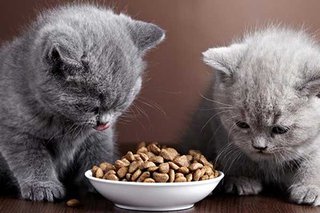How to feed an adult cat

An adult cat with normal level activity only requires a maintenance diet. A good quality, complete and balanced commercial food for cats for maintenance or for all stages of life, is suitable for feeding adult cats that are not pregnant or breastfeeding.
Cats should be fed according to their individual needs, activity level, temperature and body metabolism. The daily feeding guidelines in cat food bags are a good reference to identify the ideal weight of your cat according to its age. The daily amounts indicated in these guidelines will meet all of your cat's protein, fat, vitamin and mineral requirements.
Cats require a higher level of protein in the diet and a different nutritional balance than dogs. Like kittens, mature cats require the addition of taurine to their diet, while dogs do not. These unique dietary requirements are met by providing cats with complete and balanced cat food, and for these reasons it is not recommended to feed adult cats with dog food.
A cat can be fed a maintenance diet after one year of age. Maintenance diets are not appropriate for kittens, pregnant or lactating females. The average seven to nine pound (3.2 - 4.1 kg) cat requires approximately three ounces (85 g) of dry or semi-wet food, or 6 to 8 ounces (170 g - 227 g) of canned food per day.
The amount of feed needed will vary according to the nutrient density of the feed and the individual cat. Even when all factors are equal, two cats of similar size, age, and activity may need different amounts of food simply because they have different metabolism rates. A cat's appetite and total food consumption will vary from day to day.
Loss of appetite or reluctance to eat are not problems in adult cats unless they persist for several days or the cat shows symptoms of illness. If this happens, the cat should be examined by a veterinarian.

Here are some feeding recommendations to keep your cat in good body condition like an adult cat. The only concern to feed your cat is to provide excellent nutrition to promote health and prevent overweight. Simply feed your pet with a high-quality maintenance formula.
The gestation period represents a great increase in the nutritional requirements for your pet. During the last three weeks of gestation (out of a total of nine weeks), kittens will occupy a large amount of space in the mother's abdominal cavity, so they must be fed in small amounts several times a day. It is really important to feed a highly digestible and nutrient rich meal during this phase. In lactation, the consumption of water and energy is even more essential, since the nutritional requirements of the new mother can increase up to 3 or 4 times.
During this really demanding period, a high digestibility and high energy density diet is required. Our 1st Choice Kitten Growing, Healthy Start Diet can provide all the protein and energy your pet will need to get through its mothering period.
Reduced physical activity as a result of aging or simply as a lifestyle could lead your pet to be overweight or even obese. Overweight cats may have more health problems and a shorter life expectancy. Often, a cat's weight can be reduced simply by eliminating table scraps and treats from the diet and avoiding high-energy cat food. Diets with moderate to low energy but still containing high-quality ingredients (especially a good source of protein) should be selected.
Always concerned about your pet's well-being, 1st Choice recommends using its super premium, less fat, less active chicken formula for older adults, specially designed to meet the needs of older, less active adult cats and / or overweight adult cats Because cats tend to be food ball choppers or "occasional" eaters, they must have access to their food for several hours each day. And as with other animals, an available source of clean, fresh water is important for virtually all body functions, such as digestion, absorption, circulation, nutrient transport, tissue building, and helps regulate body temperature.